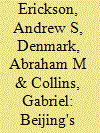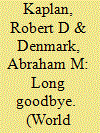| Srl | Item |
| 1 |
ID:
110523


|
|
|
| 2 |
ID:
104293


|
|
|
|
|
| Publication |
2011.
|
| Summary/Abstract |
North Korea stands apart from the rest of East Asia. In a region known for robust economic growth, integration, and long-term planning, the Democratic People's Republic of Korea (DPRK)-North Korea's formal name-is the only country in East Asia that is poor, isolated, and appears to have little grasp for thinking in terms of the longue durée. North Korea's leadership is focused exclusively on the tactical challenges of short-term regime survival. In this way, the Pyongyang elite constitute a throwback to the most morbid tyrannies of antiquity, akin to the fantastic descriptions of ceremonial politics and intrigues that we find in the annals of the Old Testament, Herodotus, and Gibbon.
|
|
|
|
|
|
|
|
|
|
|
|
|
|
|
|
| 3 |
ID:
097108


|
|
|
|
|
| Publication |
2010.
|
| Summary/Abstract |
The geopolitical theorist Sir Halford Mackinder once observed that democracies find it difficult to think strategically in peacetime. It should not be surprising then that one of the United States' core peacetime strategic objectives for more than half a century-the development of a robust international system based on free trade, international law, and international institutions-was born in wartime. The 1944 Bretton Woods agreement laid the foundation for this system to reconcile and reconstruct the Axis powers and avoid another world war. This strategy was further developed in 1950 with "NSC 68," which claimed that the development of a healthy international community should be pursued by the United States even without the existence of a Soviet threat.
|
|
|
|
|
|
|
|
|
|
|
|
|
|
|
|